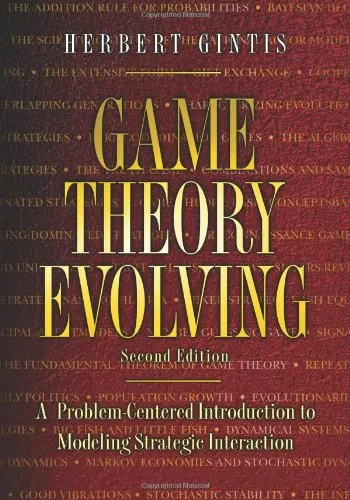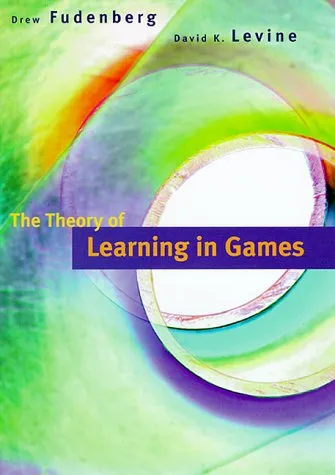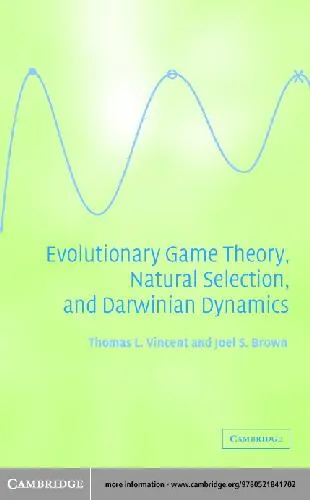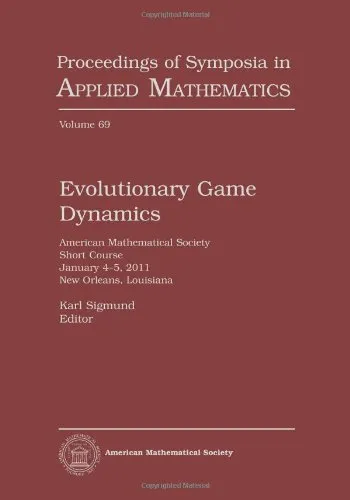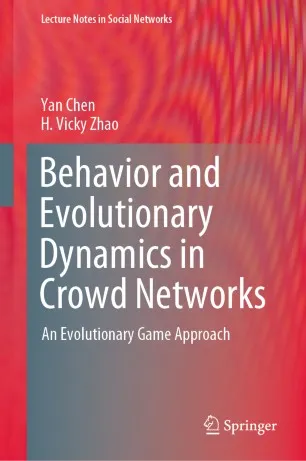Population Games and Evolutionary Dynamics (Economic Learning and Social Evolution)
4.5
Reviews from our users

You Can Ask your questions from this book's AI after Login
Each download or ask from book AI costs 2 points. To earn more free points, please visit the Points Guide Page and complete some valuable actions.Related Refrences:
Introduction to Population Games and Evolutionary Dynamics
Welcome to Population Games and Evolutionary Dynamics, a seminal work in the fields of economics, game theory, and social science. Authored by William H. Sandholm, this book offers a comprehensive exploration of the dynamic interactions among populations in strategic settings, combining theoretical rigor with real-world applications. As part of the prestigious "Economic Learning and Social Evolution" series, this book is aimed at students, researchers, and practitioners who seek to understand the underlying principles of behavioral evolution and population-level dynamics.
Through a detailed balance of mathematical foundations and accessible explanations, Population Games and Evolutionary Dynamics delves into how behavior evolves in populations subjected to strategic interactions. By bridging the gap between game theory and evolutionary theory, the book provides tools and frameworks for analyzing how individuals adapt, learn, and optimize behavior within competitive environments. It lays the groundwork for applying these concepts to economics, biology, sociology, and beyond.
Detailed Summary of the Book
The book is structured around two core themes: population games and evolutionary dynamics. The first part focuses on population games, where the strategies chosen by a population of agents collectively influence their outcomes. Through this framework, Sandholm examines how equilibrium concepts, such as Nash equilibria, manifest in a population context and how they can be interpreted in large-scale interactions.
The second part shifts to evolutionary dynamics, exploring how individual behavior evolves over time through processes such as imitation, adaptation, and learning. Sandholm meticulously explains replicator dynamics, excess payoff dynamics, and other prominent models, offering formal tools for understanding the stability and progression of population-wide strategies.
The book also integrates practical applications, demonstrating how evolutionary dynamics can be applied to economics (e.g., market competition), biological evolution, and social interactions. Through illustrative examples and mathematical models, the text ensures that readers can connect abstract theories with real-world phenomena.
Key Takeaways
- Population games model the strategic interactions within a population, capturing how agents' decisions collectively determine outcomes.
- Evolutionary dynamics provide a framework for understanding how behaviors adapt over time due to learning, imitation, or natural selection processes.
- The book introduces and explains a variety of dynamic models, including replicator dynamics, best response dynamics, gradient dynamics, and more.
- Sandholm uses a meticulous balance of theory, mathematical rigor, and applications, making the book highly relevant to economics, political science, and biology.
- Equilibrium concepts from game theory are revisited in dynamic settings, providing new perspectives on strategy, stability, and convergence.
Famous Quotes from the Book
"Population games are a powerful lens through which we can interpret the decentralized decision-making of individuals in a society."
"The study of evolutionary dynamics allows us to go beyond static equilibria, uncovering the pathways through which behavior evolves in complex environments."
"Understanding population dynamics requires bridging disciplines and integrating tools from economics, biology, and mathematics."
Why This Book Matters
Population Games and Evolutionary Dynamics stands as a cornerstone text in interdisciplinary research, seamlessly blending ideas from game theory, economics, and biology into a unified framework. This book is not only academically rigorous but also widely practical, addressing questions that resonate across diverse fields such as market dynamics, ecological balance, and social norms.
Its significance lies in its ability to equip readers with the tools to analyze complex systems where decision-making is decentralized and outcomes depend on collective behavior. As technological advancements and globalization amplify the interconnectedness of human and natural systems, understanding the principles of population games and evolutionary dynamics becomes increasingly critical for researchers, policymakers, and strategists alike.
For students and scholars, this book provides a foundation for exploring cutting-edge research in economics and evolutionary biology. For practitioners and decision-makers, it offers insights into predicting and influencing behavioral trends in competitive and cooperative environments. In short, Population Games and Evolutionary Dynamics is a vital resource for those seeking to understand how populations interact, adapt, and evolve in an ever-changing world.
Free Direct Download
You Can Download this book after Login
Accessing books through legal platforms and public libraries not only supports the rights of authors and publishers but also contributes to the sustainability of reading culture. Before downloading, please take a moment to consider these options.
Find this book on other platforms:
WorldCat helps you find books in libraries worldwide.
See ratings, reviews, and discussions on Goodreads.
Find and buy rare or used books on AbeBooks.
1590
بازدید4.5
امتیاز0
نظر98%
رضایتReviews:
4.5
Based on 0 users review
Questions & Answers
Ask questions about this book or help others by answering
No questions yet. Be the first to ask!

